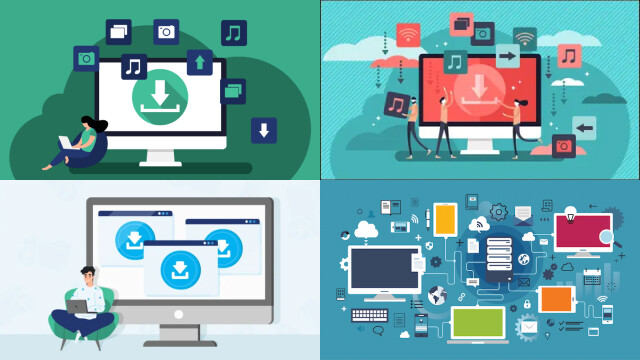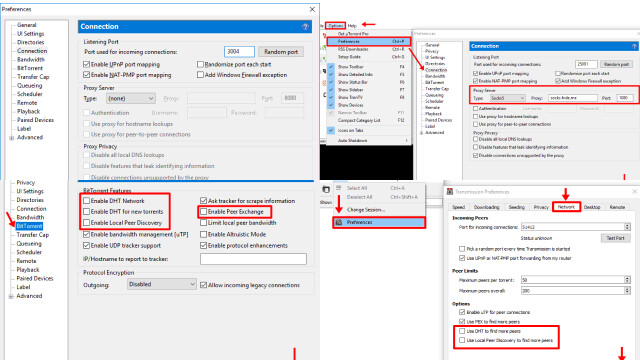Understanding the Risks of Torrenting
Torrenting is a popular method of file sharing that involves downloading files from multiple sources at once. Although it can be a convenient way to access large files such as movies, music, and software, it also carries significant risks.
One of the biggest risks of torrenting is the potential exposure to malware and viruses. Since files are downloaded from multiple sources, it can be difficult to verify their authenticity. Malware can easily be disguised as popular files, tricking users into downloading them and potentially infecting their devices with viruses.
Another risk is the legal implications of torrenting copyrighted material. Downloading and sharing copyrighted content without permission is illegal, and can result in hefty fines and legal action. While some countries have more lenient laws regarding torrenting, it’s important to be aware of the laws in your region and take precautions to protect yourself.
Using a Virtual Private Network (VPN) for Torrenting
Using a virtual private network (VPN) for torrenting can greatly enhance your privacy and security online. When you connect to a VPN, your internet traffic is encrypted and routed through a server operated by the VPN provider. This means that your real IP address and location are masked, making it much more difficult for anyone to track your online activity.
When choosing a VPN for torrenting, there are several factors to consider. First, you’ll want to make sure the VPN has a strict no-logging policy to ensure that your online activity is not being recorded. Additionally, look for a VPN that offers fast download speeds and unlimited bandwidth, as these are important for torrenting large files.
It’s important to note that while a VPN can provide significant privacy and security benefits, it’s not a foolproof solution. It’s still possible for your online activity to be traced back to you through other means, such as using a compromised torrent client or downloading copyrighted material. It’s important to use a combination of security measures, including a VPN, to stay safe while torrenting.
Choosing the Right VPN for Torrenting
When it comes to choosing a VPN for torrenting, it’s important to consider a few key factors. First, you want a VPN that has a strict no-logs policy to ensure your online activity remains private. Additionally, you want a VPN that offers fast download speeds and unlimited bandwidth to ensure a seamless torrenting experience.
Another important factor is the VPN’s jurisdiction. You want to choose a VPN that is based in a privacy-friendly country with strong data protection laws. This will help ensure that your personal information and online activity remain secure.
It’s also important to choose a VPN that offers a kill switch feature. This will automatically disconnect your internet connection if your VPN connection drops, preventing any of your torrenting activity from being exposed.
Lastly, you want to consider the VPN’s overall reputation and user reviews. Look for a VPN with a strong track record of privacy and security, and read user reviews to get an idea of their experiences with the service.
Setting up and Configuring Your VPN for Torrenting
Once you’ve chosen a suitable VPN for torrenting, it’s essential to set it up correctly to ensure it works optimally. The first step is to download and install the VPN client on your device. Once installed, log in to the VPN client using the credentials provided by the VPN provider.
Next, select a server location that supports P2P traffic and connect to it. It’s essential to choose a server that is geographically close to you to minimize latency and ensure faster download speeds.
After connecting to the server, enable the kill switch feature, which automatically disconnects your internet if the VPN connection drops. This ensures your IP address is never exposed during the torrenting process.
Finally, configure your torrent client to use the VPN connection by setting up the SOCKS5 proxy server provided by the VPN provider. Once configured correctly, you can start downloading torrents anonymously and safely.
Additional Security Measures for Torrenting
While using a VPN is a crucial step in ensuring safe and anonymous torrenting, there are additional security measures that can further enhance your protection. One such measure is to enable your VPN’s kill switch feature. This will automatically cut off your internet connection in case the VPN connection drops, preventing any accidental exposure of your IP address.
It is also recommended to use a reputable antivirus program to scan all downloaded files for malware. Many torrents may contain malicious software that can harm your computer or compromise your privacy.
Another way to stay safe while torrenting is to carefully select the files you download. Only download from trusted sources and avoid any files with suspicious titles or file extensions. Additionally, it is essential to keep your operating system and all software up-to-date with the latest security patches to prevent any vulnerabilities from being exploited by attackers.
By following these additional security measures in combination with using a VPN, you can significantly reduce the risks of torrenting and enjoy a safer and more secure experience.
Protecting Your Privacy While Torrenting
Torrenting can expose your IP address and online activities to other users on the network, as well as your internet service provider (ISP). To protect your privacy while torrenting, you should consider using a VPN or other privacy-enhancing tools.
A VPN encrypts your internet traffic and routes it through a secure server, making it difficult for anyone to monitor your online activities. Additionally, using a torrent client that supports encryption can add an extra layer of protection to your downloads.
It’s also important to avoid downloading copyrighted material, as this can result in legal consequences. Use reputable torrent sites and read reviews before downloading any files to avoid downloading malicious content.
Finally, it’s a good practice to regularly delete any downloaded files once you no longer need them, as they may contain personal information that could be accessed by others if they gain access to your computer. By taking these steps, you can help protect your privacy while torrenting.
Best Practices for Safe and Anonymous Torrenting
When it comes to torrenting, it’s important to prioritize safety and anonymity. One of the best ways to do this is by using a reputable VPN, as it encrypts your internet connection and masks your IP address. Additionally, it’s important to avoid downloading or sharing copyrighted material, as this can result in legal consequences. Another key tip is to use a reliable antivirus software and regularly update it to protect against malware and viruses that can be present in downloaded files. Furthermore, it’s recommended to avoid sharing personal information or data on torrenting websites, as this can compromise your privacy. Lastly, staying informed and up-to-date on the latest security measures and potential risks can help you stay safe while torrenting. By following these best practices, you can enjoy the benefits of torrenting without sacrificing your safety and anonymity.
Legal Considerations for Torrenting: Staying on the Right Side of the Law
Torrenting is a widely used method for sharing and downloading files. However, it’s important to understand the legal aspects to avoid potential legal consequences. Here are some key considerations:
- Copyright Laws: Many files available through torrents are protected by copyright. Downloading or sharing copyrighted material without permission constitutes copyright infringement. Always check the copyright status and permissions before torrenting.
- Public Domain and Creative Commons: Some torrents offer content in the public domain or under Creative Commons licenses, allowing for legal sharing and downloading. Ensure you have the right to access and share such materials.
- Torrenting Software: The use of torrenting software itself is legal. Torrent clients like BitTorrent and uTorrent are legitimate tools for transferring files.
- Seed vs. Leech: Seeders (those sharing the complete file) often face less legal risk compared to leechers (those downloading without sharing). Seeders typically help distribute the file legally.
- VPN Usage: Employing a Virtual Private Network (VPN) can add an extra layer of privacy to your torrenting activities, but it won’t make illegal downloading legal. It simply helps hide your IP address.
- Know Your Local Laws: Copyright laws and enforcement vary by country. What may be considered legal in one country could be illegal in another. Familiarize yourself with the laws in your region.
- Safe Torrenting Sites: Use reputable torrenting websites that adhere to copyright laws. Avoid sites known for hosting pirated or illegal content.
- Penalties: Penalties for copyright infringement can include fines and even imprisonment in severe cases. It’s not worth risking your legal and financial well-being.
- Educate Yourself: Stay informed about copyright laws and any changes in regulations. Understanding the rules can help you make informed decisions.
In conclusion, while torrenting itself is not inherently illegal, it’s crucial to be aware of the legal implications and to act responsibly. Always respect copyright laws, use legitimate sources, and consider the legal consequences when engaging in torrenting activities. Prioritizing legal and ethical practices ensures a safer and more responsible torrenting experience.
Conclusion: Torrenting Safely and Anonymously
In conclusion, torrenting can be a great way to share and download content, but it comes with risks. To ensure that you are torrenting safely and anonymously, it is important to use a reliable VPN service, choose the right settings, and take additional security measures such as using an anti-virus program and disabling WebRTC.
It is also important to be mindful of the content you are downloading and ensure that you have the necessary permissions or licenses to do so. By following these best practices, you can enjoy the benefits of torrenting while protecting your privacy and security. Remember, it is always better to be safe than sorry when it comes to online activities, and taking these precautions can help you avoid legal and security issues.





